#justice for uncle ferdinand
Text
Medusa was such a relatable character.
I absolutely agree that the gods are monsters and I’m please the show made that clear.
However, I disagree with her that she wasn’t a monster.
She became a monster when she decided to murder innocent people in her basement because she decided they weren’t redeemable. She literally hid their corpses in her cellar…
Also? It’s kind of telling that she had a few hundred monsters on her front step but THOUSANDS of regular people in her basement.
#you’re telling me uncle Ferdinand was evil??#GROVER WAS EVIL??#yea no#justice for uncle ferdinand#medusa#pjo medusa#pjoverse#pjo disney+#pjo fandom#pjo spoilers#pjo#pjo series#pjo tv show#percy pjo#percy jackon and the olympians#percy jackson#percy series#percy and grover#percy and annabeth#uncle ferdinand
83 notes
·
View notes
Text
justice for uncle ferdinand
38 notes
·
View notes
Text
Hmm…
One of Ferdinand's listed dislikes is slothfulness, which is interesting considering the scene of the BE's pledging themselves to Edelgard is called Path of Thorns, which as a biblical reference means the path he's going down is sinful. Namely, the sin of sloth. In Wind, he talks about how it's his duty to stop Edelgard from running amok after Gronder, framing it as what Dimitri's retainers should have done with his mental state. Then there's "nobles who don't act like nobles," with Ferdinand condemning Lonato while Edelgard says she would do the same thing.
Really, though, he's in the same position as Petra. A vassal of Edelgard's trying to earn back his family's lands and titles by earning it.
Caspar's dislikes mention liars and injustice. Edelgard's path is referred to as hadou by both herself and Claude (not to mention the developers) in the Japanese version, meaning disposing of her would be an act of justice. Not to mention, Edelgard lies at the creation of the BESF and after Arianrhod. He ends up being made head of the military in his endings, but the original Japanese text was so daming it was changed in the translation "Often out of control" under his leadership was changed to "sometimes reckless," while the miliary expeditions were he marched into other countries was altered to him simply leading troops.
Both these characters, despite being BEs by default and the hardest to recruit outside of the BE's House, lose their paralogues when joining Edelgard.
In Ferdinand's, we learn the Insurrection of the Seven was not because nobles tried to seize power, but because Ionius did. It's also said that Duke Aegir was blamed for things Arundel did, calling into question Ionius (who is said to be Arundel's and TWSITD's puppet in Flower) and Edelgard (who got it from Ionius) saying he was behind the experiments. Hopes takes it further with the reveal in Ferdie's Hubert support that there's no evidence linking Aegir to the worst things Edelgard accuses him of while there's plenty of evidence to his corruption elsewhere.
Likewise, Caspar brings up the things the Death Knight did during White Clouds in his, holding them against him. The paralogue rewards Caspar if he can land the killing blow on DK, proving his strength by taking out one of the hardest enemies in the game (if you don't use Lysithea). But it's a bit hard not to draw a parallel between Caspar being the only BE to fight against a family member in the game, namely his uncle Rudolf, and Mercedes having to fight against her brother outside of Flower. But while there's a hesitation between the latter, Caspar is willing to jump in on the former to do the right thing just like he was willing to jump in and help Mercedes during the paralogue.
It's the same as Byleth's paralogue being skipped in Flower. It's the game saying that joining Edelgard is bad for these characters, as they end up supporting what they don't like.
Bernie, Petra and Dorothea don't have quite as much going for them in their dislikes. In order it's imposing figures (Edelgard's "my way or die), discrimination (Edelgard persecuting the Church, working with people who view her as an animal) and arrogant nobles (Edelgard even admits she's seen as arrogant) that makes the most sense for them fighting against Edelgard. Flayn has lies, so it makes sense why she wouldn't support Edelgard even without taking into account Ed's role in her kidnapping. Dorothea's paralogue blows a hole in Edelgard's argument, showing a Crestless merchant buying a rank in court. Petra and Bernie's has Petra saying the Church is trying to force Brigid to fight, Catherine saying they were just asking Brigid (who in other routes wants to support the Church) to not get involved, and freeing imprisoned Imperial soldiers on Brigid soil. Lin has blood and fighting as listed dislikes, and he won't allow Byleth to bring Edelgard or Hubert to his paralogue.
Really, Silver Snow makes the most sense for all of the BE characters minus Ed and Bert.
16 notes
·
View notes
Text
Clown News from the Philippines.
In the 19th Congress, seniority does not seem to require years of experience in the lower chamber – at least if you look at the election of the new Senior Deputy Majority Leader.
Ilocos Norte 1st District Representative Ferdinand Alexander “Sandro” Marcos was announced as the Senior Deputy Majority Leader during regular session on Tuesday, July 26, a day after Congress welcomed his father, President Ferdinand Marcos Jr., to deliver his first State of the Nation Address (SONA).
On July 25, too, the House elected as its Speaker Leyte 1st District Martin Romualdez, President Marcos’ first cousin and Representative Marcos’ uncle.
Representative Marcos, 28, is a first-time member of the House. He occupies a post that was previously held by former Cavite Representative Crispin Remulla, a lawyer and long-time legislator. Remulla is now President Marcos’ justice secretary.
At the time Remulla was Senior Deputy Majority Leader, the young Marcos was a member of his uncle Romualdez’s legislative staff.
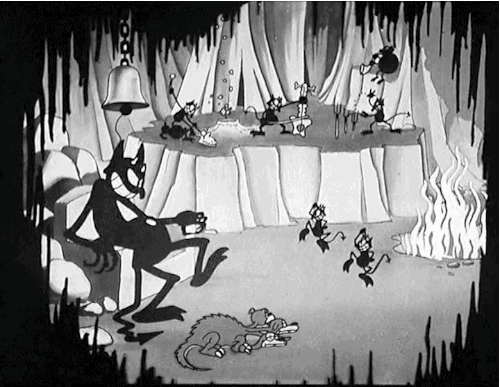
4 notes
·
View notes
Text
Random things I loved about Azure Moon chapter 16
Been a while since I wrote up one of these, but I believe it’s finally time I worked myself through the ungodly amount of screenshots I captured during my playthroughs. Anyway screenshots and thoughts below the cut (long post is long):
1. The first half of this chapter could be called “Rodrigue appreciation hour part 2″ and we start off with the impact Glenn’s death had on Rodrigue himself and his relationship with Felix. There are no easy answers here. No good guys, no bad guys. Just grieving family and friends:
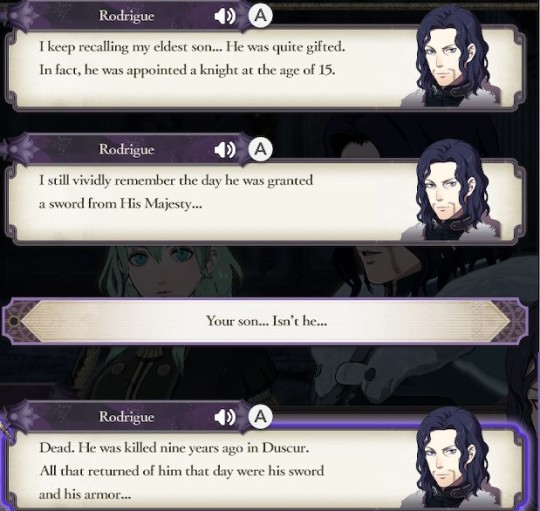

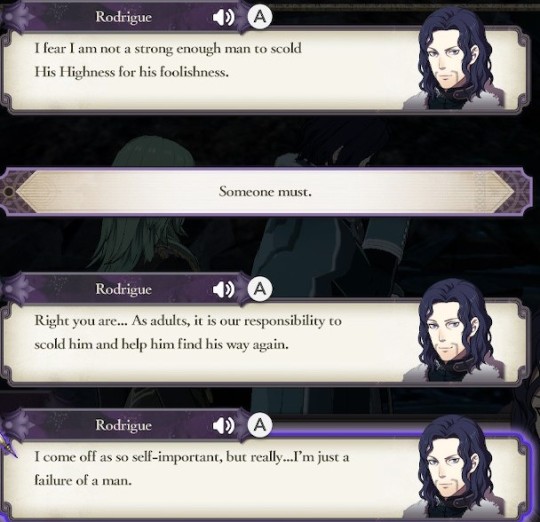
2. Rodrigue sharing provisions not just with the troops in Garreg Mach, but with Abyss as well:

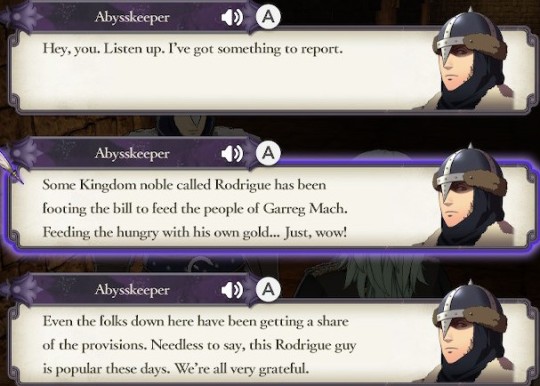
3. Rodrigue reminiscing about his relationship with Lambert and Gilbert confirming they were like brothers to each other:
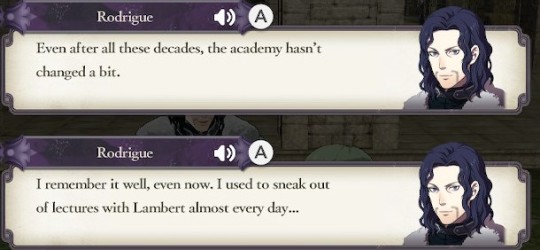
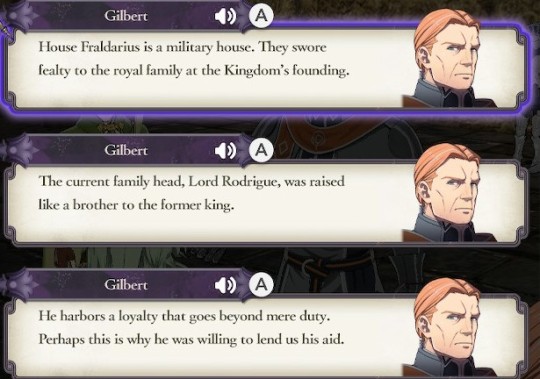
4. What it means to be a knight of Faerghus: fear no evil (except starvation), follow the path of justice, and respect your opponents, even in death:
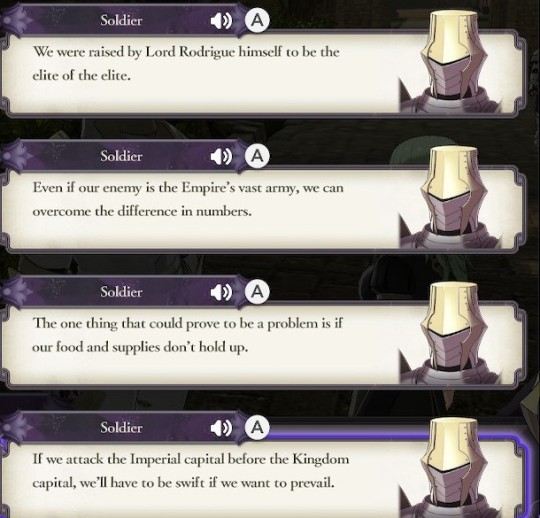
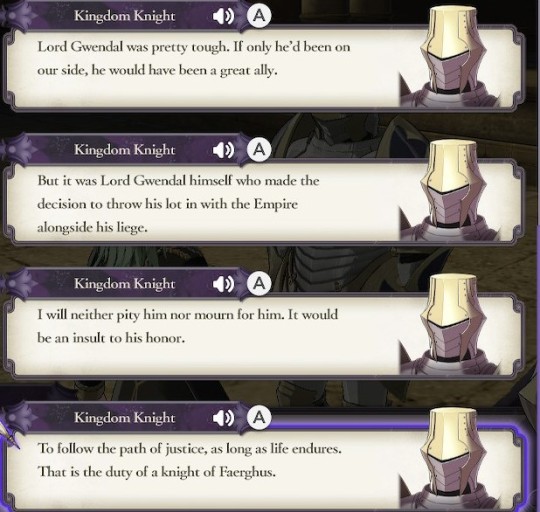
5. Ashe lampshading the fact that under different circumstances *cough*Silver Snow and Verdant Wind*cough* he might have ended up on the enemy’s side. Well, it’s Azure Moon, so I’m glad you’re here, son.
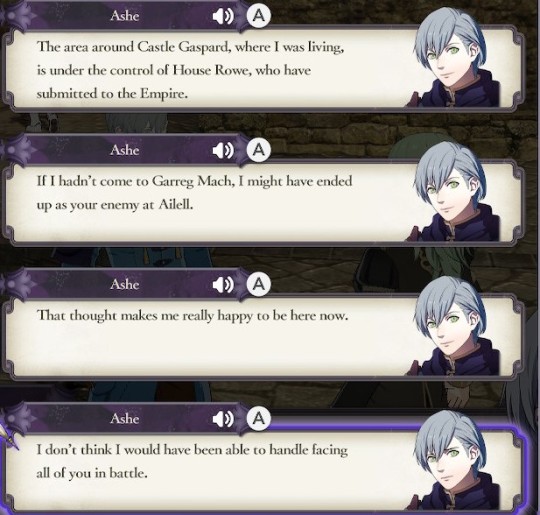
6. This not so subtle thief in Abyss:
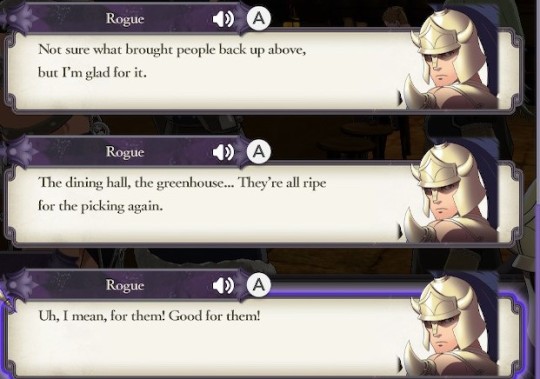
7. Hapi being apprehensive about whether the Cornelia in Fhirdiad is “her” Cornelia. I want to give her a hug (Hapi, that is--I wanna hug Hapi, not Cornelia):
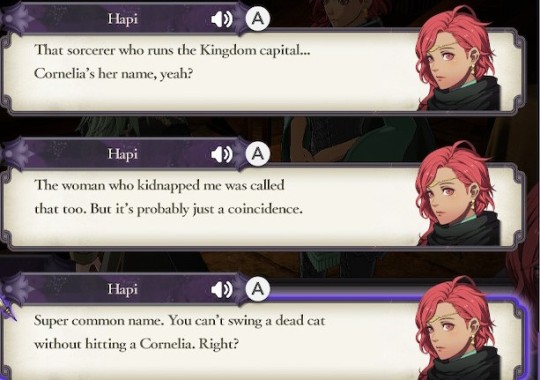
8. Leonie being worried that Dimitri may be pushing Byleth too hard:

9. Sylvain once hit on Gwendal’s daughter, because of course he did. Kinda regret I didn’t make him fight Gwendal now:
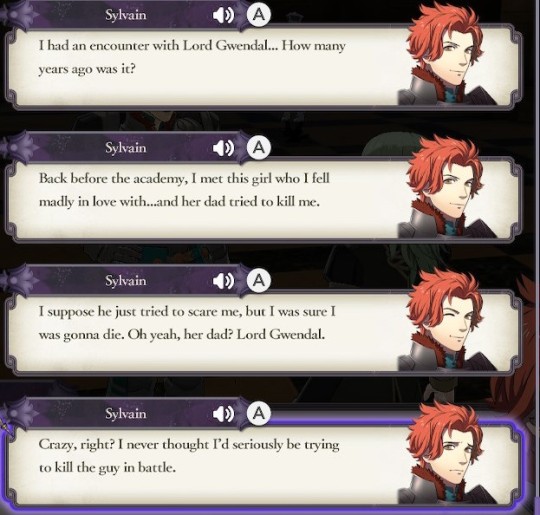
10. Ferdinand shelving his very understandable interest in helping his own family for the sake of the mission:
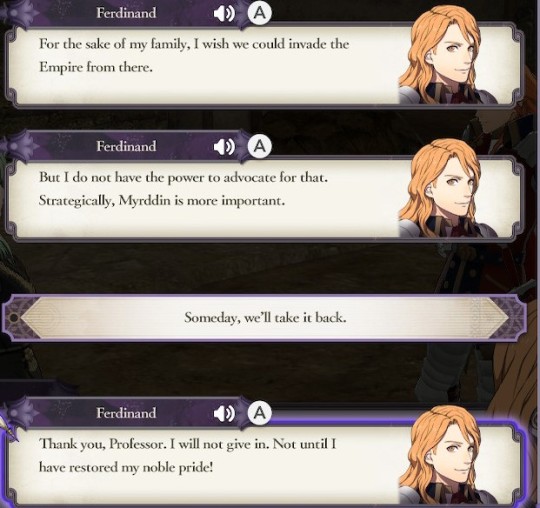
11. Felix dunking on his dad again. When I first got this dialogue, I thought he was also implying his uncle is useless, but turns out if you pick the other dialogue option, he actually explains that his uncle is a capable man. So why is Felix so upset? Because he worries about Fraldarius territory:


12. Lysithea clearly explaining why she does not want to submit to the empire. How people consider her an honorary Black Eagle is beyond me:
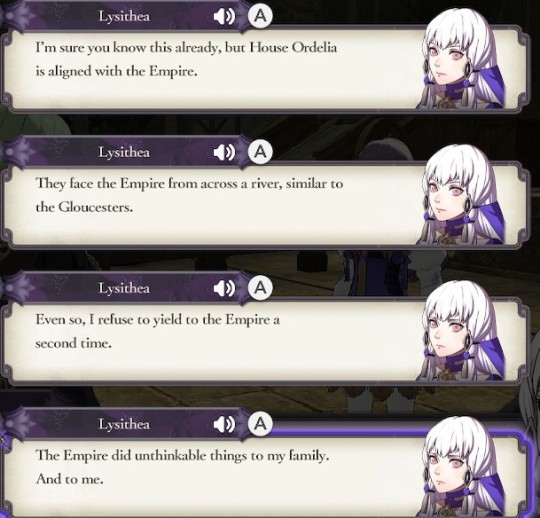

13. This hint at a noodle incident between a Knight of Seiros and Claude. Oh to have been a fly on the wall for that:
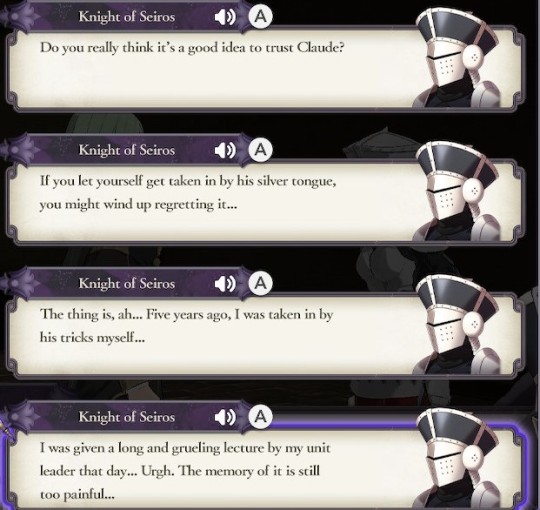
14. Dimitri calling Byleth out on their hypocrisy regarding seeking revenge:
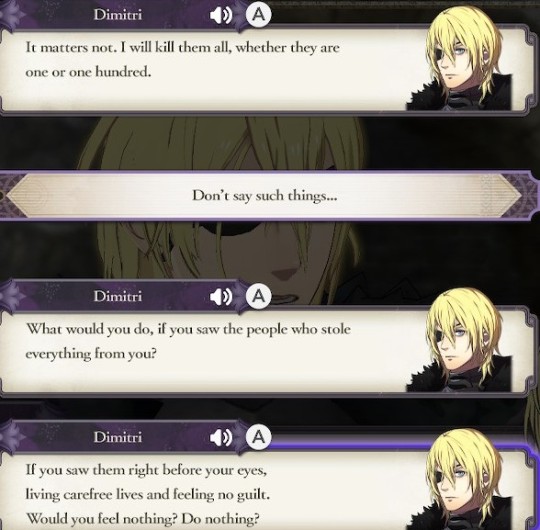
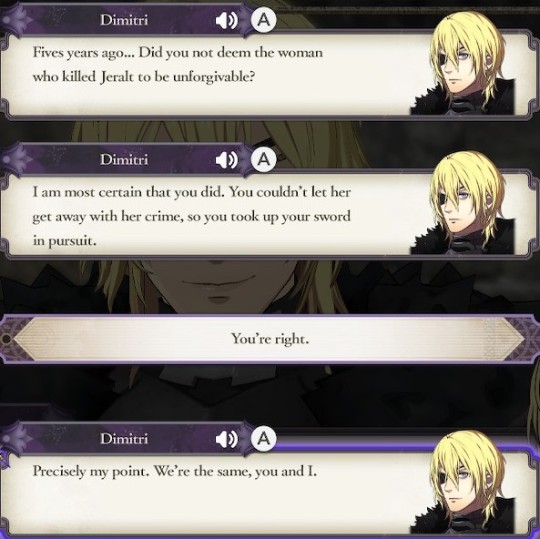
15. Felix makes a good point, Dimitri makes and equally good counterpoint, and then... instead of actually engaging, Felix nopes out of the conversation. Great job, chief. (Hint: The reason we mourn the dead, even though it is pointless for them, is because it is not pointless for those left behind--it’s a way to formalize and process grief in healthy, ritualistic ways.)

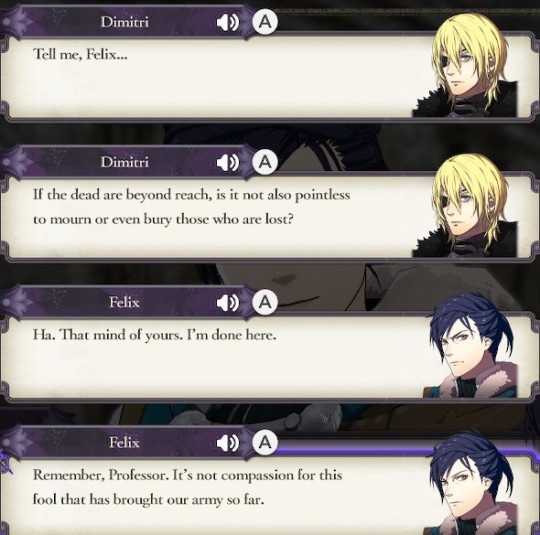
16. After voluntarily ditching the rest of the gang, Lorenz FINALLY wants to rejoin after I beat his ass, but by this point, I was so disgruntled about it, I was tempted to kill him anyway (I didn’t, because I wanted sweet, sweet A supports, but still, come on, Hellman):
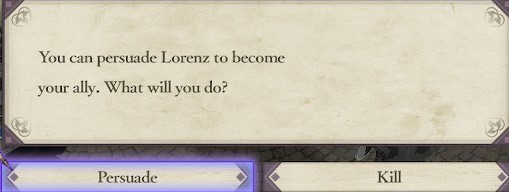
17. After being involuntarily separated from the rest of the gang, Dedue FINALLY rejoins and like Dimitri I have never been happier to see him. Just a few months earlier, Dimitri had thought him dead, one of the ghosts that trail after him. Can you imagine just how much it must have meant to him to see him there, alive? Also, Dimitri “I will use you until the flesh falls from your bones” Blaiddyd showing us his true colors again (”Do not ever throw your life away again”). The feelz... ;____;
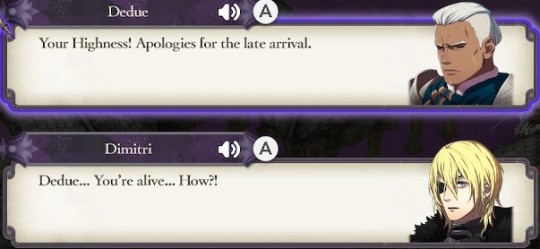
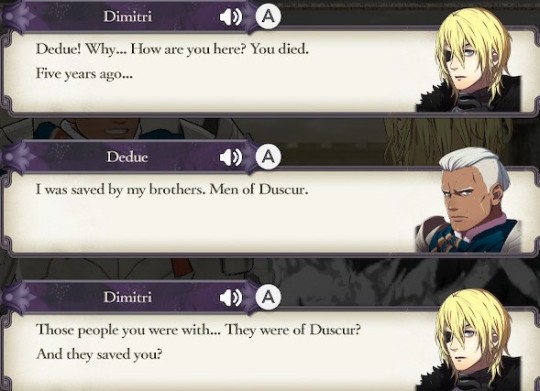
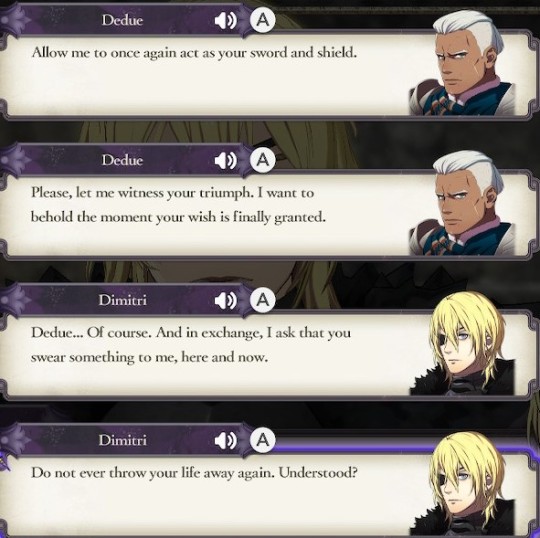
18. Good news: As Dimitri gains more and more support, his mental health improves. Bad news: Oh god, you can already tell how much he’s going to hate himself for what he has done:
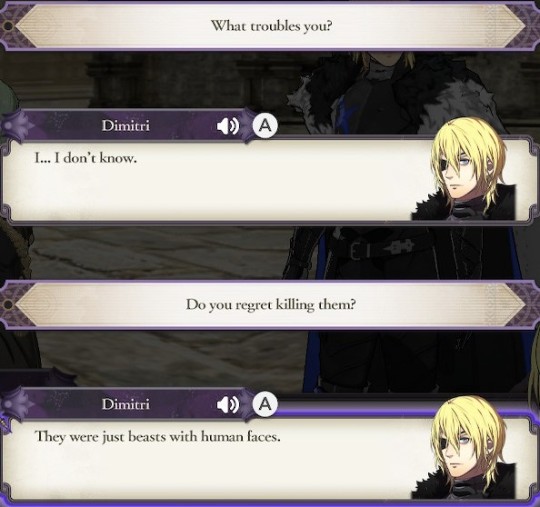

19. Last but not least, the worst idea any member of the royal family has had since Lambert decided to bring Dimitri with him to Duscur:
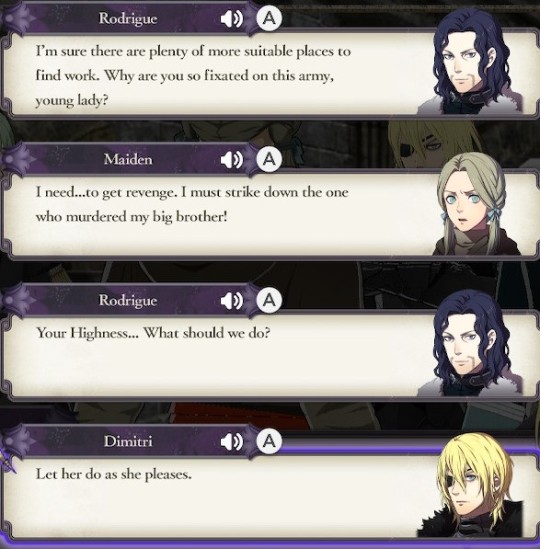
This will totally not backfire in any awful, heartbreaking way. No sir.
#Fire Emblem: Three Houses#fe3h#azure moon#Random things I love#Rodrigue Achille Fraldarius#Dimitri Alexandre Blaiddyd#Dedue Molinaro#Felix Hugo Fraldarius
14 notes
·
View notes
Text
A Martial Law Crisis of the Filipino Citizens and Their Experiences
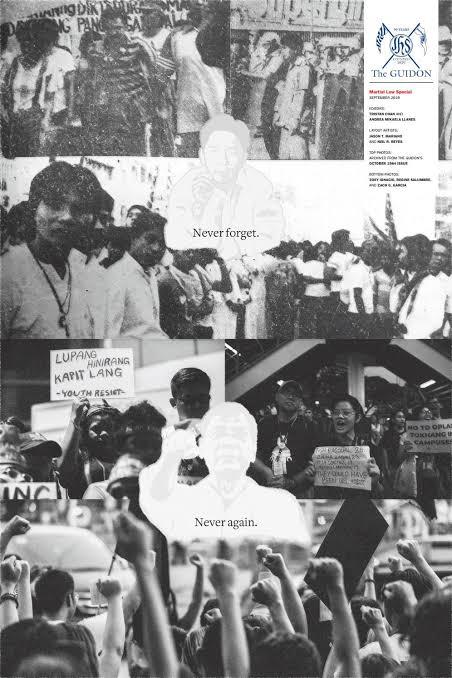
Martial law in the Philippines (Filipino: Batas Militar sa Pilipinas) refers to the various historical instances in which the Philippine head of state placed all or part of the country under military control - most prominently during the administration of Ferdinand Marcos, but also during the Philippines' colonial period.
Martial law has historically been implemented through the Armed Force of The Philiphenes and its predecessor bodies, serving as the head of state's primary tool for implementing political power in a reversal of the normal practice of civilian contro of the military.
Under the current Philippine Constitution of the Philippines, the President , as head of state and commander in chief of the armed forces, may declare Martial Law “in case of invasion or rebellion, when the public safety requires it.” Most countries use a different legal construct like "state of emergency ''
Its implementation is usually accompanied by curfews, the suspension of civil law, civil rights, habeas corpus, and the application or extension of military law or military justice to civilians.[citation needed] However, during Marcos' reign, only the writ of habeas corpus was suspended. Civilians who disobey martial law may face military courts (court-martial).
These days, I'm interviewing some of the people who lived through the brutal and gruesome events that occurred during martial law. My grandfather, grandmother, mother, father, aunt, and uncle were among those who ventured during this time. "Too much size and number of bad things happen during martial law," my grandfather and grandmother said. "Some of the scenarios include fighting in every corner and outside every house because of the killing of people with bad intentions such as rapists, thieves, gamblers, addicts, and so on."Due to a severe curfew, no one is allowed to be outside, and every home is staffed with guards and rotating military to ensure the safety and security of all residents. Those who break any of these regulations face imprisonment and harsh punishment, especially if the offense is significant. Outside, some troops swore and cursed the punished people, saying things like "p*T*nG*n@ mo come back here!!!" That's how severe every crisis is at the time". "Every shot and shot of every pistol on the road is left and right," my mom, aunt, and uncle told me. They went on to say that many homes were destroyed during this time, and that every bullet that penetrated the walls of each residence left its mark. Every criminal or felony offender is punished and seated in an electric chair, where they can die by electrocuting their bodies. Our emotional health has also been seriously harmed because we are all frightened of dying as citizens and have learned to be strong and robust in the process".
Despite this, they were proud of each other since they learnt many flaws and lessons from him, which he also used to improve their resilience and courage. Martial law is a legal term that refers to the temporary substitution of military authority for civilian government in times of war, insurrection, or natural disaster. When martial rule is declared, the military commander of a region or country has unrestricted power to enact and enforce laws. As a result, implementing martial law on every Filipino person has the goal of restoring order and/or preserving the country's current leadership.
In addition Martial law, which involves the temporary substitution of military authority for civilian rule and is usually invoked in times of war, rebellion, or natural disaster, may subject citizens who defy it to trial in a military court rather than the usual civil or criminal courts. It involves the temporary substitution of military authority for civilian rule and is usually invoked in times of war, rebellion, or natural disaster. When martial rule is declared, the military commander of a region or country has unrestricted power to enact and enforce laws.
The shortcomings and concerns that every Filipino citizen, particularly those who endured and faced with fortitude through a horrible and forceful period of martial law in the Philippines, will never be forgotten. . It has left many horrible and horrible experiences for every citizen of our country, and the government, students, and archeologists are still investigating and studying the extent of the impact and wealth of the good it has contributed not only to every citizen, but also to the repair and restoration of the Philippines as a whole.
3 notes
·
View notes
Text

{𝓑𝓪𝓼𝓲𝓬𝓼}
Name: Edwin Langdon Cassius Kingor
Alias: The Bookworm, Isaac Nathan Kingsley, Arthur Stanley Scarlet, Percy Edgar Newell, Peter Lewis Orson Tanzer, Wallace Irwin Teel, Sylvester Lloyd Young, Anthony Clark Thomas, Mr. E., Mr. Wright, Dr. Davison, Winnie, Worm
Gender: male (cis)
Age: 42
Species: human
Zodiac: aquarius / aries / cancer / capricorn / gemini / leo / libra / pisces / sagittarius / scorpio / taurus / virgo / unknown
Abilities/Talents: genius intellect, gadgetry/engineering, eidetic memory, manipulation, persuasion, research, technical skills, business skills
{𝓟𝓮𝓻𝓼𝓸𝓷𝓪𝓵}
Alignment: lawful / neutral / chaotic / good / neutral / evil / true
Religion: raised interfaith (Jewish and Catholic), considers himself agnostic. Still holds on to some of the morals and values he was taught. Celebrates both Chanukah and Christmas, and is more than happy to be included in his loved ones' own celebrations.
Sins: envy / greed / gluttony / lust / pride / sloth / wrath
Virtues: charity / chastity / diligence / humility / justice / kindness / patience
Languages: fluent in English, German, Spanish, French, Latin, Russian, Hebrew, Gaelic, ASL, Greek, Italian; conversational in Ancient Greek, Arabic, and Japanese; reading only in simplified Chinese.
Family: Otto Agustine Kingor (originally Otto Falk Wechsler) (father, deceased), Ferdinand Kingor (originally Ferdinand Wechsler) (fraternal uncle, supposedly deceased), Melanie Kingor (fraternal aunt, deceased), Sharon Davis (originally Sharon Kingor) (mother), Geoff Davis (step-father), Adela Kingor (older sister), Idalia Kingor (older sister), Wilfred Kingor (older brother), Brunhilda Ethel Wechsler (older half-sister), Lydia Limpet (ex-wife)
Friends: Julian Day (Calendar Man), Francis “Franz” Forde (Film Freak), Oswald Chesterfield Cobblepot (Penguin), Harleen Francis Quinzel (Harley Quinn), Pamela Isley (Poison Ivy), Selina Kyle (Catwoman), Thomas Elliott (Hush), Ezra Faheem Goodman (King Tut), Drury Walker (Killer Moth), Waylon Jones (Killer Croc), Kirkland Oliver Langstrom (Manbat)
Sexual Orientation: heterosexual / bisexual / pansexual / homosexual / demisexual / asexual / unsure / other
Relationship status: single / dating (verse dependent) / married / widowed / open relationship / other
Libido: sex god / very high / high / average / low / very low / non-existent
{𝓟𝓱𝔂𝓼𝓲𝓬𝓪𝓵}
Build: twig / bony / slender / average / athletic / curvy / chubby / obese
Hair: white / blonde / brunette / red / black / other
Eyes: brown / blue / green / black / other
Skin: pale / fair / olive / light brown / brown / very brown / other
Height: under 3 foot / 3-4 foot / 4-5 foot / 5-6 foot / 6-7 foot / above 7 foot
Weight: under 100 pounds / 100-150 pounds / 150-200 pounds / 200-250 pounds / above 250 pounds
Scars?: long line on right upper arm stretching from just under armpit to the middle of the upper arm, dealt to him by Victor Zsasz;, the faint remnants of an improperly healed unprofessional piercing on his right ear; another on his right nipple; small line on left heel, from a cut received while swimming in a river; nine small and faded marks of various shapes on both hands (four left, five right) from learning how to use tools for bookbinding and mechanics
Facial Features?: eyes are a very bright blue and expressive, lined on his forehead most obvious when expressing with one or both eyebrows, has some laugh lines by his eyes/nose/mouth, sometimes has bags under his eyes if he's been especially anxious for a while, slightly defined cheekbones, an aquiline nose, obvious dimples, somewhat thin lips, square jaw, pronounced chin
Tattoos?: none
{𝓒𝓱𝓸𝓸𝓼𝓮}
Dogs or Cats?
Birds or Hamsters?
Snakes or Spiders?
Red or Blue?
Yellow or Green?
Black or White?
Coffee or Tea?
Ice Cream or Cake?
Fruits or Vegetables?
Sandwich or Soup?
Magic or Melee?
Sword or Bow?
Summer or Winter?
Spring or Autumn?
The Past or The Future?
Tagged by: @fatherdamned
Tagging: steal it :p
7 notes
·
View notes
Photo



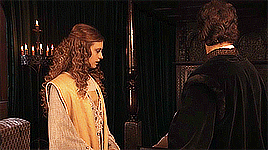
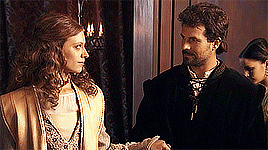

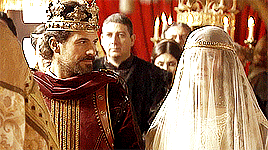
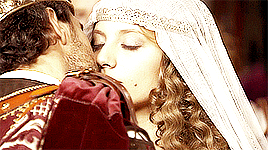

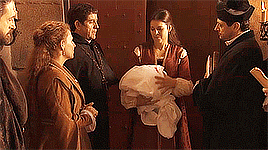
The wedding of Isabella I of Castile and Ferdinand II of Aragon (18-19 October 1469, Palacio de los Vivero, Valladolid)
John II of Aragon, as a Castilian infante and one of Castile’s great magnates, had always thought of an alliance with this realm in order to face his problems in Cataluña and with the powerful Kingdom of France. Already in 1457, John II proposed the marriage of his two children, Ferdinand and Joanna, to the half-siblings of Henry IV of Castile, Isabella, and Alfonso, although, it seems, no one took this proposition seriously at the time.
Considering the grave situation in Catalonia between 1466-67, for it was invaded by the French troops, the king of Aragon decided to negotiate with the representatives of prince Alfonso and Isabel, without breaking off ties with Henry IV, in order to assure the Castilian support. In April 1467, the leaders of Alfonso’s camp, Juan Pacheco – who was desperate to become bonded with royalty – and Alfonso Carrillo, offered him the double match: prince Alfonso would marry infanta Joanna of Aragon, and prince Ferdinand would wed Pacheco’s daughter, Beatriz. John II agreed, and although, he made it clear, he would prefer his son to marry infanta Isabella, given the desperate situation he had found himself in, he eventually gave his permission. He sent one of his diplomats, Pierres de Peralta, to Castile, with the power of attorney, to negotiate the marriage of his son with any woman of royal blood, or with any woman who did not descend from royalty. Pierres navigated skillfully between the two camps, not breaking off with anyone.
In November 1467, after the lost battle of Vilademat, John II put pressure on the ambassador of Alfonso’s party to conclude the issue of the double match. Juan Pacheco, however, seemed to be gradually distancing himself from those plans, whereas his uncle, Alfonso Carrillo, cheered John II on when it came to the Castilian marriage, agreeing with him the union with infanta Isabella, instead of Pacheco’s daughter, would be the best option. However, in June 1468, John II continued maintaining political relations with Juan Pacheco through his ambassador, Pierres. Prince Alfonso died on July 5, 1468. John II broke off the negotiations for his son’s marriage to Beatriz Pacheco. Twelve days later, on the 17 of the same month, Ferdinand authorized Pierres de Peralta and Alfonso Carrillo to arrange his marriage with infanta Isabella, the first-born heiress to the kingdoms of Castile. John II ratified those powers on July 24, 1468.
As for Isabella, she had been held a prisoner in Segovia until autumn of 1467, when her younger brother’s faction set her free. After Alfonso’s death, the rebellious camp that had elevated the young prince to the rebellious throne, in opposition to Henry IV, planned on crowning Isabella for the new queen, but she denied it, maintaining she would be Henry’s heir. Meanwhile, Pacheco and Henry IV reconciled, and the majority of the grandees that had been in Alfonso’s camp followed in Pacheco’s footsteps. Before, Henry IV had agreed to confirm his younger brother as the heir, instead of his daughter, Juana, believing the marriage of the two would remove all the obstacles. Now, in order to preserve peace in his kingdoms, the king decided to make a pact with Isabella’s party. In August of 1468, Henry IV signed a document in which he agreed for his sister to be sworn in and obeyed as his heiress. He and Isabella met at Toros de Guisando (the place between Cadalso (Madrid) and Cebreros (Ávila)), where on August 19, he invited all his vassals to recognize the infanta as his heiress. It was then, when Juan Pacheco officially changed the camps again, having departed from Ávila on Isabella’s side, during the meeting at Toros de Guisando, he positioned himself in Henry’s camp (Cadalso – Madrid).
Everyone had to pledge loyalty to the king, the rebellious villages were to be handed over to Henry IV, Isabella promised she would not marry without her half-brother’s consent, and he promised to not marry her off against her will.
Isabella left Toros de Guisando with the title of Princess of Asturias, with all of the rents and cities that went along with it. And despite rumors about what was said during that all important meeting, and against opinion of some historians, according to Tarsicio de Azcona, there is no evidence Henry IV of Castile denied the paternity of his daughter, Juana, during the meeting, or that he claimed his marriage to Joanna of Avis was invalid, and he himself was a cuckold.
Joanna of Avis’s party and many Castilian nobles were not satisfied with the new situation. They wrote to Pope Paul II, insisting princess Juana was the legitimate heiress of Henry IV, born into the canonically approved marriage by Paul II himself, and legally sworn in, as the heir to the throne. Whereas the appointment of Isabella was done against the law because it was carried out without the consent of the three states, and attorneys of the cities. It is almost certain that neither Henry IV nor Juan Pacheco, who once again had dominated the situation, in fact steering the king, had any intention to swear Isabella in as the heir legally at the Cortes. During the meeting at Toros de Guisando, she had been sworn in only by some prelates and grandees of the kingdom, who were present there, which did not make it binding.
Since October 1468 Isabella had resided at Ocaña, which was Juan Pacheco’s stronghold, and where Henry IV’s court resided as well. At the time, Juan Pacheco and his camp prepared the double Portuguese match: Isabella was to marry Alfonso V of Portugal (such match had been already proposed in 1465), and princess Juana was to be the wife of Alfonso V’s heir. This way Henry IV and Pacheco wanted to make sure Isabella would not have chances to become queen and would leave Castile once and for all. Among other candidates, proposed to her, were: the brother of Louis XI of France, Duke of Berry, the future Richard III, and Ferdinand of Aragon. Henry’s first choice was the Portuguese match, however, the duke of Berry and Richard III would also take Isabella away from Castile, which was what the king and Pacheco desired.
John II’s diplomat, Pierres de Peralta, navigated between two camps: the Pacheco’s and the Mendoza’s, trying to see which one would make a better offer. He also met with nuncio Venier, who agreed to support the union of Isabella and Ferdinand. John II also greased the palms of Isabella’s closest advisers, such as Gonzalo Chacón and Gutierre de Cárdenas, promising them many favors in the Crown of Aragon. At the beginning of January 1469, king John II and his son sent to Isabella a draft of the marital contract. It offered her many advantages and guarantees, such as the help and money to gain succession to the throne, that the princess agreed with pleasure. It was basically the only option to save herself politically. Ferdinand also had something the three other candidates did not: his own good claim to the crown of Castile through the second son of John I of Castile. In fact, John II and Ferdinand were the closest male relatives of Henry IV, with their own claim to the throne. (Henry IV was also Ferdinand’s first cousin through his mother, Maria of Aragon, John II’s sister).
After that, Isabella refused to accept any offers delivered to her by the Portuguese embassy. On January 30, John II’s agent wrote to the king, informing him the Portuguese had returned to their country, the political situation was favorable, and Isabella was ready to get married to Ferdinand, declaring:
It has to be he and absolutely no other.
Isabella said a definitive “yes” in an undated letter, addressed to Ferdinand, delivered by Pierres de Peralta, the Constable of Navarre:
To the Lord my cousin, the king of Sicily Lord cousin, since Constable is going there, there is no need for me to write at greater length, except to ask your pardon for so late a reply. And the reason for the delay, the Constable will explain to Your Mercy. I beg you to trust him and to say what you wish me to do, for that I must do. And the reason I must do that today more than ever you will know from the Constable because it is not to be written. From the hand that will do as you may order
The princess.
The marital capitulations were revised and signed by Ferdinand on March 7, 1469, at Cervera, according to which:
- Isabella and Ferdinand would obey Henry IV
- Justice would be administered by Ferdinand
- Ferdinand promised to respect the ecclesiastic liberty and fueros of the cities
- Ferdinand could not sign any document on his own, only in unison with his wife
- Ferdinand would not be able to leave Castile without Isabella’s consent or be able to take their children away
- Ferdinand would not be able to carry out any enterprise without the consent of his wife
- Isabella would receive the dowry of the queens in Aragon, la cámara de la reina in Siracusa, and 100.000 golden florins, that were to be paid within four months, after the consummation of the marriage.
Besides, John II would give her 20.000 golden florins and the ruby collar that had belonged to Ferdinand’s mother, which worth was estimated at 40.000 ducats, and which was pawned at the time.
Along with the capitulations, the petitions and demands of the above-mentioned advisers of Isabella were brought by Pierres.
Her advisers made sure Ferdinand would not have a say in the matters of Castile, being dominated by the Castilian will. Something time would verify, and something Isabella would be forced to change, later on.
Given his difficult situation, John II had no choice but to cede and accept.
Another prominent Aragonese diplomat, Pedro de la Cavallería, was sent to Castile in order to gain the Mendozas’s support and to prepare Isabella’s departure from Ocaña, which was easier than usual, given Henry IV and Juan Pacheco had left for Andalusia.
Isabella abandoned Ocaña in the middle of May 1469. On May 30, John II of Aragon informed the grandees of Valencia that Isabella planned on picking her mother up from Arévalo and taking shelter in Ávila, “at her full liberty”.
Alfonso de Palencia was sent to Aragon, in order to collect the promised 20.000 florins and the ruby necklace. It was Ferdinand in person, who got the collar out of pawn on July 19.
Isabella traveled through Ávila, reached Madrigal, and celebrated the death anniversary of her brother, Alfonso. At the beginning of August, Isabella received the embassy from Louis XI of France. The French king had sent Jean Jouffroy, the cardinal of Albi, to examine the possibility of his brother’s marriage to Isabella. The princess made the cardinal believe she would, in fact, marry the Duke of Berry, and was so convincing that even Louis XI believed this to be true until November 1469.
Meanwhile, Henry IV lost all the hope Isabella would obey him, and hence ordered the city council of Madrigal to have her arrested. Then, or even earlier, the archbishop of Toledo and Fadrique Enríquez, Ferdinand’s grandfather, came to the conclusion Isabella had to be taken to another place. The archbishop had obtained the letter, signed by Juan Pacheco, with a forged date, thanks to which, the city of Valladolid would gladly receive Isabella.
From there, the princess sent Alonso de Palencia and Gutierre de Cárdenas to Aragon, to let Ferdinand know he should come to Castile as soon as possible.
In a letter written on September 8, dispatched from Valladolid, she informed her brother that she had chosen the Aragonese prince for her husband, and tried to justify her decision.
As for Ferdinand, Alfonso de Palencia and Gutierre de Cárdenas explained to him all the reasons for which he should immediately leave for Valladolid and confront Henry IV with the done deal, and said it was convenient for him to travel in disguise, given the Duero border was in the power of adversaries of the marriage. The hazardous plan was accepted by Ferdinand without vacillation, and also by his half-brother, Juan, the archbishop of Zaragoza. However, one of the advisers thought they should consult John II of Aragon, who was at another place, at the time.
It was hard for the king to let his heir leave, to cross the enemy’s lands, unprotected because he did not have
(…) another son, or other good for his old age, and for the well-being and the succession of all those kingdoms.
But he eventually sent his consent and blessings.
In Calatayud, Ferdinand’s party received a message from Isabella, urging them to hurry. They divided into two groups, taking two different roads: one of them was supposed to be official embassy at the court of Henry IV, with which Alfonso de Palencia would go, the other, with Ferdinand, was meant to reach Valladolid. The prince left Zaragoza on October 5 and was joined by Gutierre de Cárdenas and his group at Berdejo. According to Palencia, whenever they stopped, Ferdinand acted as a servant of merchants, looked after the mules and served the supper.
On October 7, at night, the prince and his entourage arrived in Burgo de Osma, where Alfonso de Palencia and the official Aragonese embassy were waiting for him, having arrived earlier the same day. There, according to Palencia, a stone was thrown by someone, who had not recognized the prince, which almost hurt him.
He reached Dueñas on October 9, where he could consider himself safe, at the fortress that belonged to the brother of the archbishop Carrillo. On October 14, at 11 pm., Ferdinand and Isabella met for the first time, in Valladolid, at the Palacio de los Vivero, where Isabella resided. The meeting was conducted in the presence of the archbishop of Toledo, Alfonso Carrillo, who had led Ferdinand to the rooms of the princess.
According to Palencia, who was there, the princes were smitten with each other. They talked for two hours, and then a notary took down their formal promises to marry. Ferdinand gave Isabella betrothal gifts and returned to Dueñas. He came back four days later, on October 18.
The famous forged dispensation and the marital capitulations were read out, and then, the young couple said their wedding vows in the rich sala of the palace. That night Ferdinand retired to the residence of the archbishop of Toledo, and returned to the Palacio de los Vivero the next day. The nuptial mass was held, and after the celebrations (which were not splendorous, given the circumstances), on the night of October 19, the marriage was consummated with witnesses crowded at the door of the bridal chamber. Some of them entered to take the stained bedsheets, in order to show them to the people waiting in a hall below. The witnesses also surveyed the bedroom itself, to make sure they had not been cheated.
We know for sure when the wedding and consummation took place. It was Ferdinand himself, who, on October 20, reported to the Valencian grandees that:
there was a high nuptial mass. And last night, in service to God, we consummated our marriage.
Sources:
Jaime Vicens Vives, Historia crítica de la vida y reinado de Fernando II de Aragón,
Tarsicio de Azcona, Isabel la Católica: Vida y reinado,
Luis Suárez Fernández, Fernando el Católico,
Manuel Fernández Álvarez, Isabel la Católica,
Palencia, Crónica, dec. 2, lib. 2
Peggy K. Liss, Isabel the Queen: Life and Times
Nancy Rubin Stuart, Isabella of Castile: The First Renaissance Queen,
Filip Kubiaczyk, Między wojną a dyplomacją. Ferdynand Katolicki I polityka zagraniczna Hiszpanii w latach 1492-1516
#perioddramaedit#historyedit#on this day in history#women in history#men in history#isabella i of castile#ferdinand ii of aragon#isabel tve#S01E09#michelle jenner#rodolfo sancho
136 notes
·
View notes
Text
ways that one can tell that the Golden Deer were added later: How much the Blue Lions and the Black Eagles are foils for each other.
Dimitri and Edelgard: The lords, both are noble in demeanor though they do express it in different ways. both have issues with PTSD - Edelgard has nightmares and the lingering trauma of watching for years as her siblings died around her until she was the only one left which has affected her outlook on life and the relationships between people, Dimitri has an acute condition and combat based triggers with a brittle hold on his sanity (so long as he isn’t triggered he can hold on quite well to an outsider perspective, and it takes one big revelation to damage that hold, and it’s further damaged after another certain thing happens)
Dedue and Hubert: Both loyal to their respective lord almost to the point of fanaticism. Both are willing to do anything for their lord, even if would seem to go against common sense. Both called out for their undying loyalty by someone else close to their lord who challenges their lord rather than supports. However, Hubert is Edelgard’s knife in the dark, while Dedue is Dimitri’s unflagging shield.
Felix and Ferdinand: Both close to their respective lord, but also are an explicit challenge to said lord. Both nobles with fathers who are close to their country’s ruling family (Rodrigue, Felix’s father, is quite close to Dimitri especially in the aftermath of the tragedy of Duscur, while Ferdinand’s father is Prime Minister to the Adrestrian Emperor). However, Felix challenges Dimitri as a rival becuase their friendship broke after Felix witnessed Dimitri have an episode, leading him to view Dimitri as a beast - a “wild boar” - that didn’t care about anything but killing. Ferdinand’s rivalry is out of a desire to be the best advisor to Edelgard that he can be, as if he is not better than her at something, then why should she use him as an advisor.
Ashe and Dorothea: Both are true commoners, who have risen above their original lot in life and ended up in amongst nobles. Ashe used to be a thief to feed his siblings before they were adopted by Lord Lonato, and Ashe turned his life around with wishing to be a noble knight. Dorothea was a street kid, and her singing was heard by the right person who got her in the opera company. However, their experiences have given them a different view of nobles: Dorothea hates nobles for how fake they are, while Ashe wants to be a noble like Lonato.
Ingrid and Bernadetta: Both have problems with their parents. Granted, Bernadetta’s are explicitly abusive, where Ingrid’s are not, but they’re still both forced into things by their parents related to getting married. Bernadetta’s father seems to have tried to mold her into the form of the perfect silent wife, while Ingrid’s father keeps trying to arrange a marriage for her because the family needs the money and as the only holder of a Crest in her family makes her highly desirable on the marriage market. They also have friends who try to help them do new things: Annette gets Ingrid interested in makeup and her appearance, while Ferdinand tries to get Bernadetta out of her room.
Annette and Caspar: both are enthusiastic, bright, and passionate. Annette focus on studying while Caspar focuses on justice. Both are also related to nobility, though at a step somewhat removed which allows them a wee bit of freedom. Annette’s uncle is a Kingdom lord rather than her father; and Caspar is the second son of an Adrestrian noble.
Mercedes and Petra: Both are foreigners to the country that they’re currently living in, and both got to there not of their own will. Petra was a hostage sent by her grandfather as a demonstration of Brigid’s loyalty to the Empire, Mercedes and her mother were thrown out by her step-father and they had to live in a Kindgom church. Both seem to have trouble reading a room: Petra’s language troubles lead to misunderstandings and Mercedes... I don’t know if she’s truly that oblivious sometimes or if she just gathers that sort of air on purpose.
Sylvain and Linhardt: both have personalities that cause potential problems and castigation from others: Sylvain and his incessant flirting, Linhardt and his constant naps. Both have people who explicitly call out their behavior in supports: Ingrid to Sylvain, Hubert to Linhardt. Nevertheless both are dependable. Sylvain is always there when there’s a jam, and Linhardt’s got a wealth of knowledge about crests and magic at hand.
141 notes
·
View notes
Note
Okay but imagine Dimitri ever trying to explain his family situation (assuming Lambert married Rodrigue somewhere between the first divorce and his death). "Okay so there's my dad dad, my bio-dad who I've never met (may or may not be Rodrigue), my stepmom which is how I'm related to Edelgard, and then my stepdad which is how I'm kinda related to Felix and Glenn. Also to make things kinda weird my youngest and Felix's kid are probably going to get married"
And that’s not even starting in on all of the non-blood/marriage connections!
“Ah yes well, Ingrid has been one of my closest friends since childhood and then she brings her wife Dorothea and then they both bring their adopted kids that are kind of my niblings. Sylvain is also a childhood friend but technically family since he’s married to Felix? We never really liked Miklan but we put up with him because Glenn brings him and we don’t want Glenn to stop coming to the family gatherings... Let’s see... Oh we kind of adopted Ashe in High School and he insists on bringing his ‘platonic justice buddy’ Caspar so I guess we’re stuck with him too, and occasionally Hubert brings his daughter. Really we would prefer if Ferdinand brought her instead, but he refuses to be in the same room as his ex-husband and Hubert has to come or Edelgard won’t come... Oh, and my deadbeat ‘uncle’ brings his daughter and her wife and their kids, and then we lock him in the basement for being a shitty father while the rest of us eat Turkey... Yes, I think that about covers it?”
And then whoever he’s explaining this to slowly backs away because this is much more complicated than they thought they were just wondering how he knows the famous chef dude and the famous chef dude’s asshole partner.
#modern au#MORE CHEF DUDUE AU#kind of#The blue lions are a complicated tapestry#3h omegaverse#abo#Anonymous
15 notes
·
View notes
Note
I don't think it's ever been brought up about how Claude would interact with the other professors? Because I'm all for Vodka Aunt Manuela and Great Uncle Hanneman
Claude would find Manuela refreshing, as she strays far outside of the norm when it comes to authority figures. You can find him chatting with her sometimes, strolling on monastery grounds as the noon light rises. They enjoy each other’s company easily, neither of them enjoying formalities or a constant barrage of solemn topics. Everything Hanneman finds disturbing about her, Claude finds amusing and actually comforting. He definitely comes to see her as the aunt he never had, and appreciates.
Hanneman initially irritates him. Claude’s turned off by upstarts that don’t want to do anything but rattle on and on and on about one topic (Ferdinand being an exception, as he’s as harmless as a flower petal). The brunette’s focused on unity and justice, while Hanneman’s fixated on Crests-not a great match. Even less so once Hanneman gets an idea to research his Crest. For a while, it doesn’t seem like there’s any promise of a friendship brewing. But once the Garreg Mach gang reunites, after Byleth’s absence, Claude’s a little more comfortable with Hanneman, and eventually discovers that he’s actually a warm-hearted gentleman.
9 notes
·
View notes
Photo
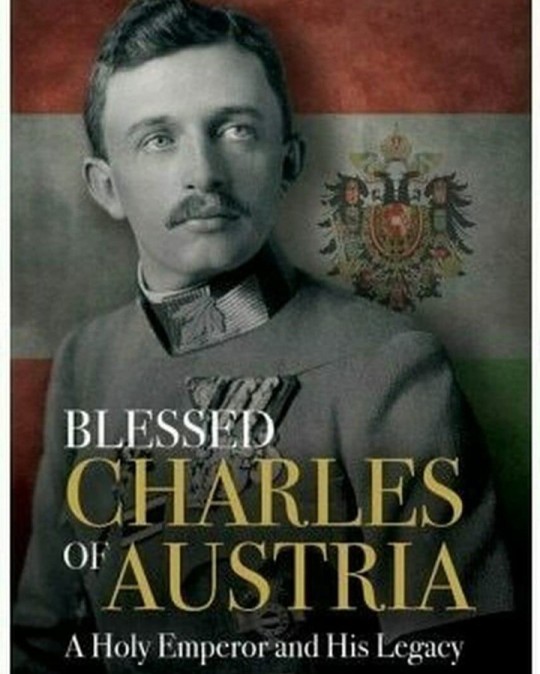
Karl of the House of Austria was born in Persenbeug in 1887. On October 21, 1911, he married Zita of Bourbon-Parma. With his wife and children, he led an exemplary family life — a true domestic church, shaped by his intimate love for the Blessed Sacrament and devotion to the Blessed Virgin Mary. In 1916, in the midst of the First World War, he became Emperor of Austria and was crowned King of Hungary. He strove for a fair and lasting peace and promoted equity and justice. After the revolution of the Provisional National Assembly in 1919, he was banished into exile, lived in poverty, and bore his illness with a profound trust in God. He died on April 1, 1922, in Funchal on the island of Madeira, while calling upon the name of Jesus. As a young man, he took for his personal motto: “I strive always in all things to understand as clearly as possible and follow the will of God, and this is the most perfect way.” In 1911, at age 24, he married Princess Zita of Bourbon and Parma, and together they had eight children. The assassination of Archduke Francis Ferdinand on June 28, 1914, triggered World War I. At this point, Charles became the presumptive heir to the throne of the Austro-Hungarian Empire. Two years later, upon the death of his great-uncle, Emperor Francis Joseph, Charles became emperor and king of Hungary. He saw his office as a mandate from God and as a way to implement Christian charity and social reform. He worked to end the war and was the only leader to support Pope Benedict XV's efforts for peace. In March 1919, he was exiled to Switzerland. From there, he tried to prevent the rise of Communism in Central Europe. He also tried to return to power twice in 1921, but gave up at the risk of a civil war. He never gave up his crown, even when exiled to the island of Madeira, Portugal, where he lived in prayerful poverty until his death from pneumonia one year later. Charles was beatified by Pope John Paul II in 2004. https://www.instagram.com/p/Cbz8ZmtrAc6/?utm_medium=tumblr
0 notes
Text
Pileños in History: Lorenzo Relova, Associate Justice of the Philippine Supreme Court
Justice Lorenzo Rivera-Relova, a Filipino judge who served as the 103rd Associate Justice of the Supreme Court from May 14, 1982, until January 19, 1986, was born on January 20, 1916, in Pila, Laguna, Philippines.
His father, Jose Diaz Relova, was the first lawyer to practice in Pila.
His uncle Regino Diaz Relova was a lieutenant colonel in the Katipunan in the Laguna province, Philippines.
His spouse was Concepcion Dimaculangan-Relova ("Zita").
He served during the dictatorial regime of President Ferdinand Marcos.
He graduated from the Ateneo Grade School in 1929, and with honors from Ateneo High School, and later taught as a law professor at the Ateneo Law School for more than forty years. He was inducted into the university's Professors of Law Hall of Fame in 2012.
http://newsinfo.inquirer.net/308622/leb-to-install-law-profs-hall-of-fame
He was the country's oldest living Supreme Court justice at the time of his death in 2014
He is known for breaking the deadlock in the high court on the question of whether to allow the February 1986 snap elections to proceed. This triggered the events that finally led to the ouster of Ferdinand Marcos.
He died on April 23, 2014, at the age of 98.
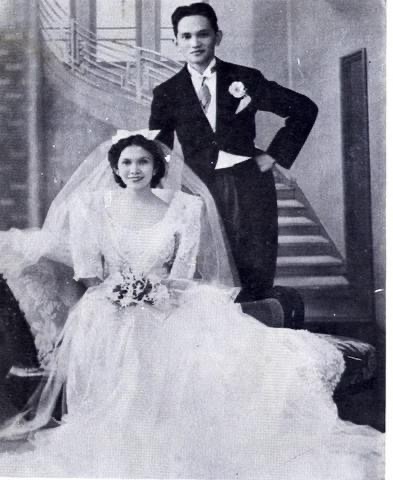
Lorenzo Relova Wedding Photo. Image from the Pila Family Archives.
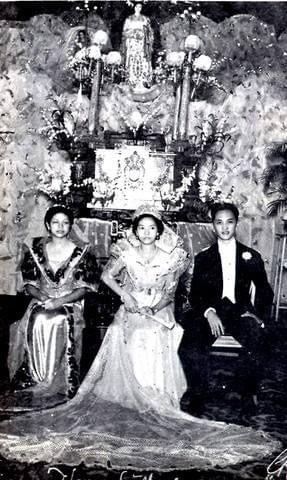
Image from the Pila Family Archives. Josefina Relova-Rivera (middle), Lorenzo Relova (right), 1937 photo in the Pila Church.

The Arcadio Relova Ancestral House in Pila, Laguna. Photo Credits.
0 notes
Text
Hi Jess, I saw that you haven't watched many movies for the last couple of years... So as the nosy person that I'm I decided to make a list of what have been released this year to help you to make your list of 'to be watched'. I'm guessing this will be a long journey so buckle up and lets begin.
I will base this lists in my personal opinion and try to keep it spoiler free.
(I’ll link every movie to it’s imdb page so you can watch the trailer and read the synopsis)
I will start with the list of movies that I watched of the 2017 movies:
Underworld: Blood Wars - I love the Underworld movies so if you like them it's a good option, but it's not one of the best tho;
A Dog's Purpose - It's obviously a dog’s movie. It’s cute and I liked;
Resident Evil: The Final Chapter - It’s another Resident Evil movie, there isn’t much more that needs to be said. So if you like Resident Evil or if you have already watched all the other movies of the franchise this must be in your list;
Get Out - It’s a okay movie;
The Girl with All the Gifts - I kind of liked the book, so I watched the movie. It’s a slow movie and not much happens;
Logan - I’m into any superhero or people with powers movies;
The Shack - It’s about find your faith again I guess... it’s a okay movie, but slow and not very eventful. I remember liking the book (but I read it like 10 years ago and don’t remember that much) even if I’m not a religious person;
Before I Fall - She dies, she comes back, she lives the same day several times... i like that plot, don’t know why, have seen several things with it. It’s a teen/young adult movie I guess. Not great, but watchable... good for that days you want to sit and watch a movie while doing your nails or something like that;
Beauty and the Beast - I liked it a lot, it’s a lot like the old animation movie that was one of my childhood favorites... so nostalgia feels;
Power Rangers - Okay, that one it’s a little of a guilty pleasure, because it’s Power Rangers, but I liked it.
The Boss Baby - It’s a animation. I love animations and I really liked that one. It’s very cute;
Colossal - Omg, I watched it because of Anne Hathaway, but it’s so bad. Seriously so freaking bad.
Gifted - It’s freaking cute, the girl it’s a prodigy and it’s raised by her uncle(Chris Evans) and they’re lovely and when the grandmother discovers she’s a prodigy she tries to take her guard. I loved that one;
Unforgettable - A woman marries a guy and his ex-wife is a crazy woman obsessed with having a perfect life and look perfect that doesn’t accepts that the guy isn’t with her anymore and she goes crazy, not even her own daughter is save, the woman is craaaaazy. Not great, but watchable;
The Circle - Watched for Emma Watson, but it’s boring;
Guardians of the Galaxy Vol. 2 - Not bad, but the first it’s a lot better;
Wonder Woman - Girl Power! I liked it, but everyone knows this one and I don’t even need to say anything;
The Mummy - I knew it wouldn’t be good, but I watched anyway. I wasn’t wrong;
Despicable Me 3 - Watchable;
Spider-Man: Homecoming - I liked it a lot;
The Dark Tower - I didn’t liked it, but made me curious to read the book, maybe with a lot more details it’s good;
American Assassin - I watched because of the Dylan O'Brien, it’s not bad.
The list of movies that I didn’t watch it’s considerably longer than the ones that I watched and this are the ones that caught my attention and are in my “to be watched” list:
xXx: Return of Xander Cage - I didn’t watched the second one, but I like Vin Diesel’s movies so I’m thinking about to watch this one;
The Great Wall - I have read some positive commentaries about it, but I confess that I don’t remember what they were, but still is in my “to be watched” list;
The Space Between Us - Don’t know why I want to watch this one, it’s a blockbuster, but I have no expectations to it;
John Wick: Chapter 2 - I watched the first one so I’ll watch this one too... I’m guessing someone kills his new dog;
A United Kingdom - That one looks interesting, the story takes place in the 40′s and it’s about this African prince who is studying in Britain and he falls in love and marries a white woman;
Kedi – It’s a documentary about cats in Istanbul, and while I’m not a fan of documentaries the cats in the trailer were super cute and I’m inclined to watch it;
Table 19 – It’s a comedy with Anna Kendrick and I like her;
The Last Word - It’s a movie about a woman who it’s very controlling and she decides that she wants to write her obituary in advance so she can be remembered as she wishes, but the girl who writes the obituaries will only write facts and she start to goes after a bunch of people of the woman’s life and everyone hates her... and I’m explaining it so poorly, but the trailer looked interesting;
Ghost in the Shell - I’m curious, but my expectations aren’t high;
The Zookeeper's Wife - The woman owns a zoo and she uses it to help and hide Jews during the German invasion;
King Arthur: Legend of the Sword - I like King Arthur/ Merlin stories;
Everything, Everything - I read the book and even if didn’t like it I want to watch the movie;
Sleight - It’s a story where a boy gets involved with crimes and then he sees one of the guys shoot someone to death and he sees this life it’s not for him, but they’ll not let him just get out of this life. While this is not exactly the kind of movie I would watch the boy has powers and this is why I want to watch it.
3 Generation - It’s about a single mother raising her daughter with her mother and her mother girlfriend and the girl turns out to be trans and it shows the process to accept it and to get the long gone father signature to the girl be able to do the sex-change surgery;
Baby Driver - I don’t know... it’s another blockbuster;
War for the Planet of the Apes - I like Planet of the Apes;
Valerian and the City of a Thousand Planets - I like fantasy and pretty colors;
Kidnap – I’m watching this one because Halle Berry is in it;
Kingsman: The Golden Circle - I liked the first one;
Happy Death Day - She dies, she comes back, she lives the same day several times... and this one has a final destination vibe (and I love final destination);
Thor: Ragnarok - It’s a superhero movie, this is it.
Murder on the Orient Express - My first Agatha Christie book was Murder on the Orient Express and I loved it, so I’m watching the hell out of this one for nostalgia;
Justice League - It’s a superhero movie, this is it;
Coco - I love animations and this one looks cute;
Star Wars: The Last Jedi - I love Star Wars;
Jumanji: Welcome to the Jungle - I’m not really a fan of the old Jumanji, but I watched it several times as a kid and I’m curious about it;
Pitch Perfect 3 - I have to watch the second yet, but I liked the first so this one is in my list too;
Ferdinand - It’s a animation and looks cute.
This is a list of some blockbusters that I have no intention to watch, but you can be interested:
Split - Multiple personalities disorder;
Rings - I’m sick of the movies of that franchise;
A Cure for Wellness - the trailer made me very uncomfortable;
Kong: Skull Island - I’m not a fan of King Kong;
Life – Alien like kind of movie... I don’t like Alien;
CHiPs - Comedy, the offensive kind of comedy... I don’t like that kind of movie;
The Fate of the Furious - Fast and Furious fifteen or something like that, I don’t know I watched only the first two;
Alien: Covenant - I do NOT like Alien;
Baywatch - I don’t know maybe I could watch this one, I like The Rock, but I really don’t see this movie having any plot;
Pirates of the Caribbean: Dead Men Tell No Tales - again Pirates of Caribbean fifteen, I watched the first three and this is it;
Dunkirk - I’m just not interested;
Atomic Blonde - for what I heard it’s one of that standard action movies: doesn’t have much story, it’s basically just a tough guy killing everyone and sleeping with hot girls... but with the Charlize Theron in the place of the though guy;
It - Everyone talked about this one, but I’m terrified of clowns so I’m not doing that to myself;
Mother! - I don’t even know what this one is about I just know that it’s with Jennifer Lawrence.
I hope that helps you to find out what you want to watch from this year releases even if it’s only for the links...
(@sugasxsugar)
2 notes
·
View notes
Text
yo o o whats happening
I think a Guy Ritchie Raffles movie would be good ?
I don’t think he’s gonna, because ultimately it’s too similar to sherlock holmes which he’s already doing great with. But if he did, out of necessity it would walk talk and shoot gun differently. Probably more in the vein of The Man From U.N.C.L.E. with the expensive clothes and cars and high stakes sneaking around (napoleon solo even has the thief background so hyeah if you didn’t like his holmes adaptations pls go watch that)
And that would be amazing, right??? Holy fuck the dude makes crime movies /it’s what he does/ i would absolutely kill to see him take on /the gentleman thief/ archetype the way he took on /the secret agent/ in the man from uncle. here are some things raffles has that he has already demonstrated great use of in his other films
Morally ambiguous characters
Characters who are unbelievably good at one thing, usually a crime thing, and are flawed in almost every other way
Assholes who do shitty things but are so charming you can’t help but root for them
Usually because they’re up against someone who’s also on the wrong side of the law but also kills puppies or whatever, y’know. worse than them in some way
Narration
Card game scenes
CRIMES
Say what you will about RDJ as Holmes but that depiction of Victorian England kicks my ASS EVERYtime i watch game of shadows
So with that in mind here are some things I could see him doing and basically my version of a good Raffles adaptation by Guy Ritchie, and me, AJ
The movie starts with Wilful Murder, told as a pretty short introduction sequence. this shows us what their lives are like - as well as sets up the main conflict of the movie; their reputations are constantly in danger because of their activities. Raffles likes to think he isn’t above killing to prevent their exposure, and Bunny would follow him anywhere. But there’s no tension or suspense, because they fuck up climbing over the fence, they fuck up breaking the window, and they both trip over Angus Baird’s body and are extremely relieved like oh thank god.... thank fucking god he’s already dead (we realise yeah... these guys are kinda fuckin it up at the burglar thing...)
from upstairs, somebody shoots at them and BAM! TITLE SEQUENCE! Full of still frames and short slow mo clips of them rushing away from the house pursued by a gang of ruffians who had other beef with angus baird over idk a franz ferdinand song or something like that? what do the kids listen to these days. there are explosions, not sure why
dunno what the plot is but it involves at least three break ins, each zanier than the last, it probably takes some notes structure wise from Mr Justice Raffles but eh
Raffles probably has a threesome with Teddy and Camilla? just sayin
Inspector Mackenzie is there in like, a zenigata capacity and SHE’S BEAUTIFUL
Bunny does some voiceover but get this, it’s in the context of letters he’s writing to Miss Carruthers because that sounds like some movie shit they’d do! right!! she’s in the movie and she has a GUN
They play card games because it’s a guy ritchie movie but maybe we can work in that adorable thing from the show where the stakes are candy-based . huff. hff. charactersizaation.
I think Raffles’s sister helps them get out of a jam mid-movie. I’m just throwing in all the ladies i can
Cursing ( a lot )
Did i mention gun
JUST watch me I’m gonna write this whole thing just to prove a guy ritchie style raffles movie could be good
Bunny doing a voiceover of some burglary shop talk, explaining in detail how something is supposed to work, then as we see them doing it everything goes completely wrong and along with being funny as fuck its very becoming of Bunny as an unreliable narrator
a shot that shows you the inside of a lock as it’s being picked probably
like a slow motion fight scene between two people who don’t really know how to fight would be pretty great lmao
and then it ends with a gift of the emperor/knees of the gods style sacrifice and we realise Raffles was a selfish dick, but in the end he helped Bunny in the only way he could: by removing himself from his life
and Bunny is having a moment by himself like dear god he really did care and Raffles crashes through a window and dusts himself off like “back”
Roll credits
The best thing about what he does when he adapts is that he takes stuff like the characters and setting of the whodunit holmes stories and spy/action man from uncle and gives them a sense of humor about what they are- so yeah, maybe when you think about sherlock holmes your first thought isn’t greasy iron man kicking a guy so hard he flies 20 feet backwards through a boarded window and into a lake (and lives!) but fuck- I like sherlock holmes, I don’t really care for action blockbusters, but for some reason when you combine them it’s entertaining as all get out. And of course it’s not like the books, because that would be boring. And if anyone adapted Raffles in a way that was exactly like the books it would be boring.
Because the books are comprised of two things: One, very technical, concise descriptions of the way things happened, and two, how Bunny, as the narrator, felt about them. One being something movies are very good at showing, and two being something movies are certainly capable of with a very sensitive, emotional director like Lynne Ramsey but like... NOT guy ritchie, for sure. But if you want a Raffles movie, do you WANT something sensitive and nuanced? Do you want a heartfelt exploration of a younger man’s changing vision of the man he met in his youth as he finds himself manipulated into a life of crime or whatever? maybe but ... i dunno that sounds boring to me. maybe as a short film i could handle it
but like the real thing is “I want a fun movie and I want to see these characters I love brought to the cinema as it is in this day and age in a manner which i feel is true to the original nature of the stories and reminds me why I love them” and not turned into something which to me is barely recognizable from the source material
and if you don’t like ritchie’s holmes adaptations that’s probably why. Personally, i think Game of Shadows is a wonderful film and one of the best adaptations of a Professor Moriarty story, defs my favorite. Plus Rocknrolla and Snatch are some of my favorite movies and thinking about a Raffles adaptation with all the fun and charm and excitement of those gets me SO PUMPED UP
But also I know if it’s hollywood imma be disappointed. good thing its never happening?
you know what would definitely suck though? a wes anderson raffles. lmao holy shit
#unpopular opinion ??? fuck lmao#i shouldn't write#raffles#mails my raffles fanfiction to guy ritchie's house
7 notes
·
View notes
Photo
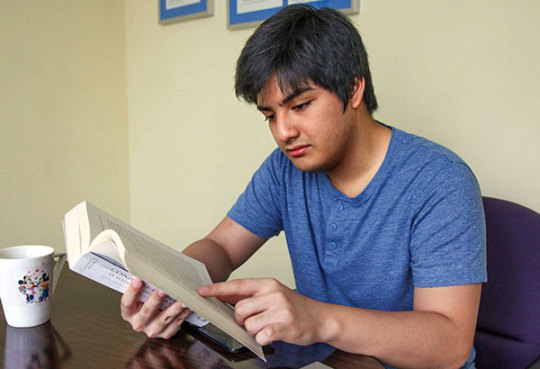
FM propagandist’s grandson fights ‘lies’
By Aurea Calica (The Philippine Star) | Updated February 20, 2017 - 12:00am
MANILA, Philippines - For the grandson and son-in-law of former president Ferdinand Marcos’ chief propagandist, newspaperman Primitivo “Tibo” Mijares, “fake news” and “alternative facts” about what happened during martial law are dangerous and alarming.
Mijares himself was the source of false information disseminated to the public through government-controlled media at the time, and Marcos’ declaration of martial law in 1972 was generally accepted by the public, not knowing the consequences of such declaration.
But enlightenment came upon Mijares in 1975 when he learned that the late dictator did not intend to use martial law to quell communist insurgency and violence but to perpetuate himself, along with his family, in power.
Mijares went to the United States in 1975 on an official mission without his family knowing he never had any intention to return. He then testified before the US Congress on the abuses of martial law.
Mijares’ youngest grandson, Joseph Christopher “JC” Mijares Gurango, is taking on the fight of his grandfather for freedom and democracy, especially now that historical revisionism, especially through social media, seems to be succeeding in changing the people’s knowledge and perspective of what happened in the past.
The details about his grandfather’s work during the Marcos regime are recounted in the book “Conjugal Dictatorship,” which JC has now republished to educate Filipinos, particularly the young, about martial law.
The book, with 200 additional pages contributed by millennials, will be launched tomorrow at the Bantayog ng mga Bayani in Quezon City.
“You could read this book and think my grandfather was a bad person. I don’t think he’s a bad person but if you do, that makes sense (because of what he did for the Marcoses),” the 19-year-old JC told The STAR in an interview with his father Joey and Kevin Ansel Dy, who is helping in the advocacy to thwart historical revisionism.
A former journalist who became the “media czar” of Marcos, Mijares disappeared a year after his book was published in 1976. The book was reprinted in 1986 after the EDSA people power revolution that toppled the Marcos regime.
According to Joey, Mijares was last seen in January 1977 in Guam and was never heard from again. A few months after that or in May of 1977, his youngest son Luis or “Boyet” was kidnapped, tortured and found dead weeks later. Luis was only 16 when he was killed.
Mijares’ wife is Priscilla, a judge, and JC is the son of one of their daughters, Pilita, a medical doctor.
To promote the truth about history, JC said the first step was to have the book out, as it contains the accounts of a “real insider, (Primitivo) being closer to Marcos” than almost anybody else.
For instance, JC noted the “press release” about the infamous story of then defense secretary Juan Ponce Enrile getting ambushed to justify martial law “was written two days before it happened” – a detail that people would find in the book.
Let history stay as it is
What happened to Mijares and his youngest son was so traumatic for the family that they decided not to talk about it anymore and burden the children, Joey said.
But the resurgence of the Marcoses in the political scene and the surprise burial of the late dictator at the Libingan ng mga Bayani last November prompted the family to break their silence.
JC came across stacks of his grandfather’s book about two years ago and just “connected the dots” after reading it because his mother told him about the incident involving his uncle Luis when he was about 13 or 14 years old.
“The idea of taking on the fight is really one of the main reasons why we’re republishing this book. It’s because maybe people are saying that you should move on, ignoring the fact that that part of history is actually being changed…They’re trying to make that part of history remembered in the wrong way,” JC said.
“So when it comes to people getting tired, and it’s more than just people getting tired, it’s more people are also dying, we’re running out of people who can actually attest to it, we’re running of people who can tell the story. So it will be up to people like me who are still going to be around... we have to tell the story,” JC added.
Aside from history starting to be changed, JC said a lot of other things might happen.
“The Marcoses might come back to Malacañang so when you say something like move on, my only response is we’ll move on once they stop trying to change history,” JC said.
He said Marcos’ son, former senator Ferdinand Jr., even had the “balls” to run for vice president and almost won, which would show they were close to getting back into power.
Idea of justice
JC and his father said the whole effort of republishing the book was not about anger or revenge but just to ensure that the things that happened before would not happen again.
They no longer talk about the need to hold the Marcoses liable for the disappearance of Mijares and the death of his son Luis or whoever the masterminds were, but to make them accountable to the nation, especially with regard to the public money they stole.
“I think the important take away would be that this is not just a problem of the past,” JC said, pointing out along with his father that the Marcoses should admit their sins and give back to the people whatever they took while they were in power.
They also abhor the culture of impunity that prevails, such that some of those in government are no longer afraid to commit irregularities, not to mention human rights abuses.
And aside from the vast resources obviously being used to paint a different picture of the martial law regime, JC conceded they would have to fight indifference and lack of knowledge among the people.
“I think there will be people who would not be convinced no matter what you do,” JC said, but stressed he would like to reach those “on the fence” who “really don’t seem to care about this.”
“I want to show that this is something worth caring about and I want to show them that this is relevant, this is still something we should worry about right now,” JC said.
“Spark”
Aside from having the book republished, JC said they were planning to go to schools and disseminate the book online through their website, www.conjugaldictatorship.com complete with photographs and videos.
His father said the key is also to have martial law become part of the curriculum in schools.
“Once it is taught, that’s half the battle won already,” Joey said, noting that knowledge and education are the best weapons against the spread of wrong information about the past.
Dy said JC could be the “spark” or the beginning of a movement that would push their advocacy for the long haul. Dy said the reception of the public for JC was encouraging, as people would come up to him to discuss their own take about martial law.
JC, who grew up in Manila and was home-schooled after attending an international school, described himself as a typical millennial. He said his mother was very protective of him because of what happened to his uncle Luis.
He insists there was nothing special about him to be chosen to do the talking for the family, only that some were getting tired and old as well.
“My parents are very afraid for me. And I am of course also very afraid…But that’s not a reason not to do it. Just because you’re afraid does not mean you should just let whoever do whatever they want. It’s important to do this and it’s important to not let them get away with this,” JC said, noting the power and the resources that the Marcoses have to this day.
But if there is any consolation, Joey said they could at least talk freely now about what happened – something they could never do when he was JC’s age.
“It’s already a celebration of what had been accomplished since then. If we don’t talk about these things, that actually now opens a possibility that what happened then, would happen again,” Joey said.
“People don’t seem to realize today, especially the young people, just how oppressive and how bad things were,” Joey emphasized, adding people tend to believe online articles and other social media posts that those were the “golden years” of the Philippines.
“Imagine hearing that (when our) generation…know how life was at the time,” Joey said, stressing that “if you start believing that and many people are believing that, it makes it more possible, it makes it more acceptable, when somebody comes along and says we need to declare martial law again for whatever reason.”
Reality check
Joey stressed fake news or alternative facts could alter people’s perspective of things and how they would respond to developments.
But he said they would know for a fact that those with the Marcoses at the time they were in power lived a life that was beyond normal.
For example, Joey said his father-in-law’s family had a printing press in San Juan, lived in a privileged community in Quezon City and had several cars, which was unusual for a middle class family.
Things changed when Mijares joined the Marcos government from being a part of the Baguio Midland Courier and the Manila Chronicle then owned by the Lopezes.
Primitivo wrote a column called “PM Views” that was widely known to contain the thoughts of the former dictator being conveyed through him, Joey shared.
“He was the original whistle-blower,” Joey said – and paid the price for it.
Joey said Primitivo’s family got so preoccupied with the case of Luis that they only realized his father-in-law was probably killed as well, because 1986 came and still, up to this day, not even a shadow of him has been seen. Mijares has been legally declared dead.
“That episode (with Luis, including the court case and media coverage) lasted two years,” Joey said.
[Source: PhilStar]
#the martial law thingy#marcos#ferdinand marcos#philippines#Primitivo Mijares#boyet mijares#the people#philstar#inspiration
12 notes
·
View notes